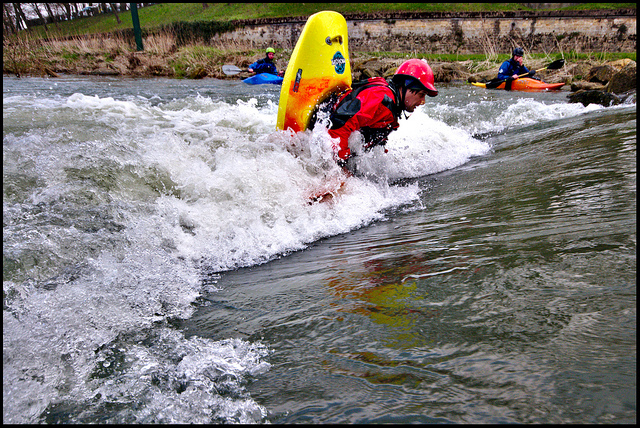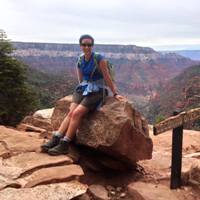“Okay. We have to cut straight across the rapids, stay left to avoid the rock, then cut right after the sunken tree, then all the way back to the left so we can pull out,” shouts the river guide.
His blonde, rain-soaked beard has become plastered to his neck and jaws. His once royal blue rain coat is now a sopping wet shade of deep navy, the hood clinging to his head like a second skin. He’s shouting because the peals of thunder are loud enough to be felt in one’s bones and the river’s roar is a terrifying level of deafening.
I listen intently, perhaps out of sheer terror, perhaps because the serious look on his face makes me think the consequences are pretty grave if his instructions are not followed. “Because if you miss this pull out, the next one’s not for another three miles down river” he says. Wow. As if I weren’t already coming to terms with an unhappy ending, this pushed it over the edge.
I’m usually not one to give up, but that day was a true test of mental and physical limits. I was a bit worried about going out on my first whitewater kayaking experience given the heavy rains we’d had for the past 36 hours. However, the trip started fairly well; overcast skies, but perhaps that was a blessing to keep Moab’s typical triple-digit temperatures at bay. We had a very mild 70 degree day.
As I got acclimated to the nuances of paddling an inflatable kayak in a swiftly moving river, it began to rain. Very quickly, the rain turned into heavy, rapidly falling drops that reminded me of Hollywood movie rain, but “Hey, you’re going to get wet on the river anyway,” I told myself. But then the winds picked up and the thunder rumbled in—very quickly. Within the space of a few minutes, we went from drizzle to full blown thunderstorm. Totally safe, right?
As I asked myself what the likelihood of getting struck by lightning was, I noticed that the raindrops were really
beginning to hurt and make loud bouncy-noises off the kayak. Wait. Raindrops usually don’t collect in frozen piles that you can scoop us in your hands. Hail. Hail. Bouncing off my arms, head, and legs. %$&*
I started to shiver, seeing how it was quite cold with no sun and the rain and ice pellets and whatnot. The river guide, in the big raft with half of our group, called us over and yelled that the first rapids were coming up. Great! Because this day needed more fun? I was unprepared for the strength and force of the waves, coming quickly from multiple directions, making it very difficult to heed the instructions of “keep your nose straight into the wave.”
Well, WTF do you do when waves come from multiple directions simultaneously? The answer is: you curse. A lot. Obscenities that would make my mother cry. Then you pull your head out of the sand and try to stay afloat. It’s amazing how laser-like your focus becomes when capsizing, serious injury, or drowning is on the line. I made it through, but I was ready to be done for the day and seriously questioned the decision to continue the trip with the awful weather.
The hail passed, but the rain did not. Successive storms rolled over us with varying degrees of severity, including the group favorite of a lighting strike on a small island directly ahead of us. I don’t know what was hit, but you could smell something burning. Totally comforting. Two more rapids and I somehow was still upright. Shivering, miserable, and exhausted, but upright.
Enter the instructions from the opening. More rapids? Dear God. Not what I wanted to hear, but at least it would mean this trip would be over. The rapids went well, perhaps motivated by my desire to get the hell off the river. Stay left, cut right, okay—done. The last part was to cut all the way back across the river and we’re done.
Yet again, I underestimated the sheer power and force of a storm-enraged river. I paddled as hard as I could but was still being swept away downriver and to the right, away from my group. I paddled until I expected my biceps to rip through my flesh and slap me in the face for the stupidity of paying for this adventure. The rest of my group waited for me, holding on to branches along the shore, shouting some sort of f%$#ing motivational things like: “You can do it!” or “Come on, just a little more!” Yet I still kept slipping away. I started to panic, yelling “I can’t!” hoping for some help. Throw me a line, send some of the stronger rafters to help me…something. Anything? Nothing.
There’s a terrible moment when you realize no one is coming to help you. No one will save you. It’s like time momentarily stops while you begin to seriously contemplate: “Is it better to die from hypothermia, drowning, or being struck by lightning? Because those are the only three options that seem available right now.” Now, I realize that in my panic I was maybe a bit overly dramatic, but I really didn’t see any way out of this. My arms and back were beyond exhausted. My now-purple hands could barely grip the paddle any more. My legs were beginning to turn a lovely, mottled shade of purple-blue, and I was told that my lips were pale blue. “I can’t!” I kept shouting. But I realize now what, “I can’t” really meant was, “I’m so damn scared right now that I don’t know what to do.”
Fortunately, some instinct took over and I remembered the Driver’s Ed advice about skidding on ice; that you should actually turn into the direction of the skid until you can get back out. “What the hell?” I thought. It can’t get much worse. So as I stopped panic-paddling, I must have popped out of whatever turbulence had caught me, and I was able to slowly, painfully, make my way back up to my group and leave the river behind.
I promise this is where I get to my point, which is the nature of what we all really mean when we say, “I can’t.” More specifically, the “I can’t” that’s motivated by fear or uncertainty, not the “I can’t dunk a basketball,” (because I’m too short), “I can’t make it to that meeting” (because I have another obligation or just don’t want to), “I can’t buy a private Leer jet” (yet!), etc. Those are the “I can’ts that are due to true limitations, to lack of desire, or lack of resources. I mean the “I can’ts” or “I could nevers” like:
1. I could never live alone.
2. I could never travel alone.
3. I can’t have short hair/wear that/look like this or that.
4. I could never run a marathon or ride my bike 100 miles.
5. I can’t sing in public or perform on stage—No way! Too nerve wracking.
6. I can’t paddle/go on/walk any more.
Those kind of “can’ts.” I know, because I had said those all before, but sure enough, I’ve done them all and lived. Just like I have to mentally upbraid myself for my fear-induced kayaking, “I can’t.”
Fear. It makes us doubt our own power and our own ability to rise to occasions, break barriers, and embrace our inner awesomeness. It can paralyze us and make us believe we have to play it small, play it safe, and stay hidden in our little cozy cocoons. But fear lies to us. We don’t have to listen to it, and we should learn when not to. I’m not advocating taking up grizzly-bear wrestling, snake-handling, or base jumping, but I think you know what I’m getting at.
What are your “I can’ts/I could nevers”? List them now. Go on, humor me. See how many of them are real, true, safety and well-being concerns and how many are based on, “I’m afraid I’ll: fail/look stupid/not be good enough.” Or even worse, are there any that are, “I’m afraid I’ll like it too much and that will rock the boat and make me re-evaluate everything else”?
I have a few more of my own personal “I can’ts” on my list, but I’m learning to tune-in and listen to how much is legitimate concern and how much is just plain fear. More often than not, it’s fear. Please join me in a fear-crushing campaign where we can break through our boundaries. Life is far too short to have that regret burning in the pit of our stomachs. The “Wow, I really wished I would have…” kind of regret that can make you feel like you ate far too much at the Chinese buffet including the side-order of self-loathing.
You are the only one that can save yourself. You are the only one with the power to change your situation and your life. Deep within you is the knight-in-shining armour; the hero/heroine that you’ve been waiting for. Don’t wait. Challenge your fears today. I promise that I will be right there with you doing the same.
Relephant Read:
How to Overcome your Fears & Start Living.
~
Author: Stephanie Kotz
Editor: Travis May
Image: Flickr/Stefan Schmitz


 Share on bsky
Share on bsky





Read 0 comments and reply